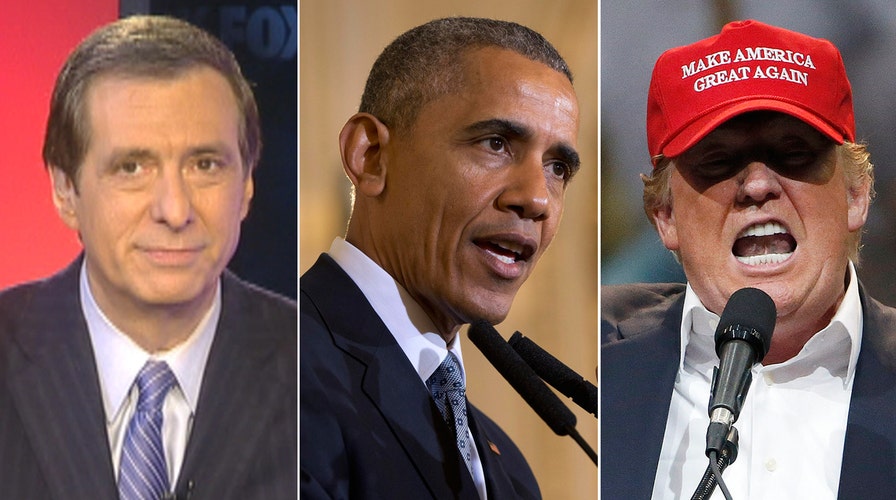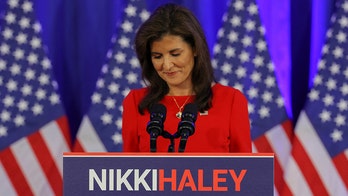Kurtz: Why the media are bashing everyone in politics
'MediaBuzz' host says the press is 'accentuating the negative' for everyone from Trump to Obama
We are now at the point in this political season where everyone is hating on everyone else.
Think about it: When was the last time you saw a piece or watched a segment in which a candidate was portrayed positively?
Presidential campaigns are a tough business where every contender gets roughed up as the price of admission. But the level of vitriol—the pundits against Donald Trump and his rivals, and the candidates sliming each other—has spiraled way out of control.
It hasn’t been Morning in America for a long time. In fact, it’s pretty close to a dark and stormy midnight.
And the hyperspeed news cycle has all this unfolding at a head-snapping pace, like an endless feed of Twitter taunts.
In the deafening din of the media echo chamber, it sometimes seems like these are the sounds that break through:
--Donald Trump is a fascist threat to our way of life, says racist things and loves to attack women over their looks.
--Ted Cruz is the most unlikable man in Washington, maybe the world, and such a nutty right-winger he’d probably like to shut down the government forever.
--John Kasich is a cranky spoiler impersonating a nice guy who is staying in the race out of pure ego.
--Hillary Clinton is a deceitful woman who gets on everyone’s nerves, keeps lying about her email server and is lucky she’s not in jail.
The “war over the wives” controversy is perhaps the perfect encapsulation of the gutter campaign, with Trump blaming Cruz for the posting of a nude magazine photo of his wife, Cruz blaming Trump for unsubstantiated mistress allegations in the Enquirer, and the media breathlessly following each twist and tweet.
It’s a chicken-and-egg game to assign blame for the campaign’s locker room tone to either the politicians or the journalists. Perhaps it reflects the crude and often mean-spirited tone of our culture.
Here, among thousands of possible selections, is a sampling. Let’s start with Sunday’s New York Times op-ed page, where everyone gets whacked.
Ross Douthat, a thoughtful conservative voice, says Ted Cruz looks like he’s faking it:
“The fact that he seems so much like an actor hitting his marks fits with the story of how he became Mr. True Conservative Outsider in the first place. Basically, he spent years trying to make it in Washington on the insider’s track, and hit a wall because too many of the insiders didn’t like him — because his ambition was too naked, his climber’s zeal too palpable. So he deliberately switched factions, turning the establishment’s personal disdain into a political asset, and taking his Ivy League talents to the Tea Party instead.”
On such issues as the government shutdown over ObamaCare, an exercise in “self-serving cynicism…Cruz has proceeded with several fingers in the wind; every time the conservative mood has shifted even a little, he’s shifted quickly too.” He accuses Cruz of first being obsequious toward Trump, but turning to self-righteousness now that “the name-calling and scandal-mongering have been turned against his reputation and his family.”
After that, and with a parting shot that “his cynicism can be repellent,” Douthat allows that the hard-working Cruz has earned his standing in the primaries.
On the liberal side, I have a lot of respect for Nick Kristof, but in his Times column he buys into an increasingly common myth. The headline is “My Shared Shame: The Media Helped Make Trump”:
“Although many of us journalists have derided Trump, the truth is that he generally outsmarted us (with many exceptions, for there truly have been serious efforts to pin him down and to investigate Trump University and his various business failings). He manipulated television by offering outrageous statements that drew ever more cameras — without facing enough skeptical follow-up questions.
“It’s not that we shouldn’t have covered Trump’s craziness, but that we should have aggressively provided context in the form of fact checks and robust examination of policy proposals.”
While the press could always do a better job, I’d argue that there has been endless fact-checking and it hasn’t hurt Teflon Trump.
The second “failure” is that “we wrongly treated Trump as a farce.” Not all of us, Nick, but that is especially true among the Huffington Post liberal crowd (though plenty of conservative pundits fell into this trap).
But I strongly agree with Kristof’s last point: “We failed to take Trump seriously because of a third media failing: We were largely oblivious to the pain among working-class Americans and thus didn’t appreciate how much his message resonated….We inhabit a middle-class world and don’t adequately cover the part of America that is struggling and seething. We spend too much time talking to senators, not enough to the jobless.”
Also on the op-ed page, Maureen Dowd looked at President Obama “tangoing into history”—that is, enjoying his trip to Argentina and Cuba and failing to reflect the public alarm over the Brussels bombings:
“Barack Obama started off as a man self-consciously alone on stage and that’s how he is exiting. He is, for better and worse, too cool for school. His identity is defined by his desire to rise above the fray. Unfortunately, he is in politics, which is the fray…
“The president has a bristling resistance to what he sees as cheap emotion. (See: flag pin, 2008.) That has led him, time after time, to respond belatedly or bloodlessly in moments when Americans are alarmed, wanting solace and solutions.”
Well, how about John Kasich? He hasn’t offended too many people, right?
National Review Editor Rich Lowry is in the #NeverKasich camp:
“This truly is a year when the rules don’t apply. If they did, John Kasich would be back in Columbus trying to figure out whether he sells his soul to Donald Trump or endorses Ted Cruz.
“Instead, the Ohio governor is still out on the trail running a delusional vanity project masquerading as a presidential campaign. There is no appetite for his pragmatic, ‘can’t we all get along’ campaign among Republican-primary voters, who have made that abundantly clear.”
Oh, and the Times news section joins the fray by quoting Kasich associates who “recall a three-decade career in government punctuated by scolding confrontations, intemperate critiques and undiplomatic remarks.”
I could go on and on. Slate says Trump “seeks to destroy people who stand in his way, especially women, even if he looks disgusting doing it.”
New York magazine says that “unfortunately for Cruz, his logic backfires. Because if real men do not attack women, Cruz is fake as hell. In fact, he might be faker than Trump.”
Maybe, on some level, we get the elections we deserve.
This is a reality show campaign in which reality, perhaps in the form of terror attacks, sometimes intrudes. It is endlessly entertaining, but often feels like tragicomedy with no heroes.





